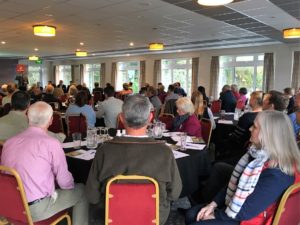 Farmers should make the most of the next few years as they are likely to be the most stable and profitable for a while, experts have warned.
Farmers should make the most of the next few years as they are likely to be the most stable and profitable for a while, experts have warned.
Speaking at a recent meeting in Dartmouth, Andrew Vickery, head of rural services at accountant Old Mill, said that farmers were likely coming into a period of greater stability, despite the political landscape shifting on a weekly basis. “Look for the positives, but be realistic,” he said. “Agriculture is unlikely to be top of the list in terms of policy change for the Government, therefore the status quo is likely to be maintained. Farmers should therefore take advantage of the next three to four years and think about what to do after 2020.”
Farmers should take the opportunity to get their accounts in order as managing tax and paying off debt would be critical for many, warned Mr Vickery. Now was the right time to think about business structure, succession planning, auto-enrolment pensions, capital disposals and gifts. “There is no room for complacency,” said Mr Vickery. “There is plenty to be done before 2020, that will be more difficult after.”
Though the Spring Budget did not bring any significant changes, farmers should plan for the reduction in Corporation Tax from 20% to 17% by 2020, be aware of restrictions on buy-to-let properties and the increased main residence nil-rate band for inheritance tax of up to £1m. “The Government’s Making Tax Digital plans have been scrapped, which may be a temporary or permanent measure,” explained Mr Vickery. “Though this would have driven more red tape regulation, it would also have been a real incentive for those who need to tidy up their accounts.”
The current agricultural climate also presented an ideal time for farmers to fulfil their personal aspirations, according to Stuart Coombe, rural financial planner at Old Mill. “Question your priorities and whether the farm can support you and the next generation, and assess whether you are paying too much tax.” He suggested having open discussions with the family on succession planning, including splitting the estate for the next generation and retirement. “Drill down to what you need to do, what is already in place and how changes to the industry may affect your plans,” he advised. “Keep things in review, even if you get to where you want to be.”
According to Paul Blundell, relationship director rural services at HSBC, the next few years were an opportunity for farmers to make best use of profits. “What farmers do with any profits is very important – whether paying off debt or putting cash aside for the future.” With uncertainty facing agriculture after 2020, having money put aside would be important, so now may not be a good time to invest in new machinery. “Advisers have never been more important but do question whether your consultant is being realistic.”
In 2016, the UK economy grew by 1.8%; the second highest growth of any country in the EU, said Mr Blundell. “HSBC predicts that inflation will reach 3% by the end of the year, while interest rates are unlikely to change before 2019. There has been a spike in commodity and milk prices which is really positive for the industry. This is therefore a time to make money and deal with it sensibly.”
Land values in Devon were likely to stabilise and only see small growth rates of 2-3% over the next few years, suggested George Alder, head of farm agency at Stags. Investing in land was therefore still a safe bet. Farmers could also look to convert old buildings but should be aware of planning regulations as they were still complicated, added his colleague Alister King-Smith, head of planning at Stags. “Applications for new builds are becoming more onerous for landowners – so they must think and plan ahead and work with local stakeholders.”
- For more information, contact Andrew Vickery on 01935 709321.




